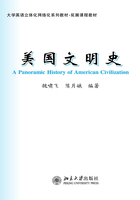
PREFACE
On behalf of the Gilder Lehrman Institute of American History, I am honored and pleased to be invited by Professor Matthew Wei to contribute a few words to his important book A Panoramic History of American Civilization. When Professor Wei was a Visiting Scholar in the United States, his research was assisted in part by the Gilder Lehrman Institute because we are committed to supporting American history both through scholarly research and publication, and through improved teaching at every level, elementary school through university. We are delighted that Professor Wei's scholarship now gives rise to this book designed to introduce students in China to the story of American civilization.
In 1981 I had the good fortune to visit China as part of a group of Americans and Canadians who toured Guangzhou Province (on bicycles! ) for two weeks and then went on to Peking. It was a time of change, with China and America opening up to each other. Of all that I experienced on that extraordinary visit—the towns, the historic sites, the factories, the food, the opera, and so much more—what impressed me most forcefully everywhere we went was one thing: the friendliness of the people toward these North American visitors. Through this book, those friendly relations can continue to develop. Today's generation of Chinese people can come to know the history of the United States—its founding principles, its people drawn from across the world, its struggles and triumphs, its progress through the years down to the present.
We at the Gilder Lehrman Institute are dedicated to support ing the study of American history both within the U.S.A. and in other countries. Thanks to the web, the Institute can offer online access to its Collection of 60, 000 rare American historical documents to students and teachers everywhere. Viewers can see handwritten letters by George Washington, Frederick Douglass, Abraham Lincoln, and thousands of other figures in history, both the famous and the long-forgotten. There are manuscripts about the history of the Revolutionary War and the writing of the Constitution, slavery and abolition, the Civil War and Reconstruction, The 13th Amendment and the growth of freedom since, the presidency and the lives of ordinary people. Readers need only click on Gilderlehrman.org or use a search engine to find and search the Gilder Lehrman Collection.
The Institute is also pleased to offer teachers and schools in China the opportunity to participate in our programs. We sponsor one-week teacher seminars with major historians such as Gordon Wood, Eric Foner, Carol Berkin, and others every summer. We offer an online affiliate school program, pod casts of great historians talking about major topics in American history, publications and classroom materials, lesson plans and much more—all available through our website, where full information can be found. Whether teachers and students are looking for information about American history, or for selected documents by historic figures like Washington and Lincoln, or for primary texts to use in their study of English, all can be found among our online offerings.
In the world today, there are no two countries whose understanding of each other matters more than China and the United States. Everywhere in the USA interest in China—its culture, its language, its history—is surging. Indeed, my fourteen-year-old daughter has just finished a six-week research project about China, culminating in a long essay on the history of the Chinese civil service examinations, for her school here in New York City. Similarly, we hope the interest in American history in China will continue to grow and spread, deepening the understanding and mutual respect between our two countries, and strengthening our connection in the future.
The Gilder Lehrman Institute congratulates Dr. Matthew Wei on this valuable new book. And we extend an invitation to all its readers to contact us by email or through our website to pursue their further interest in American history.
James G. Basker
Gilder Professor of Literary History
Barnard College, Columbia University
President, Gilder Lehrman Institute of American History